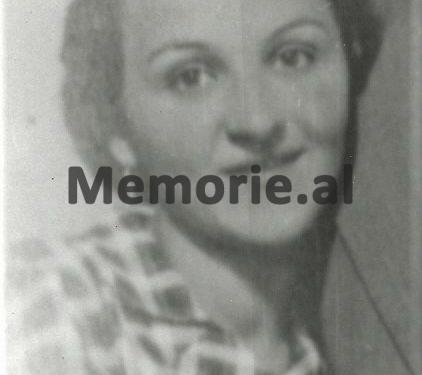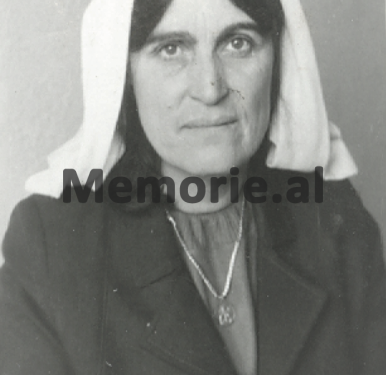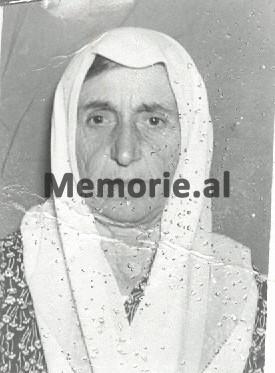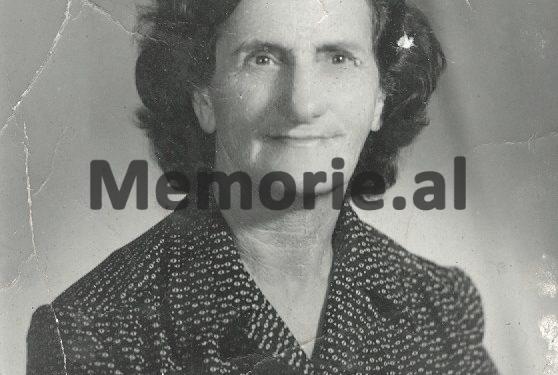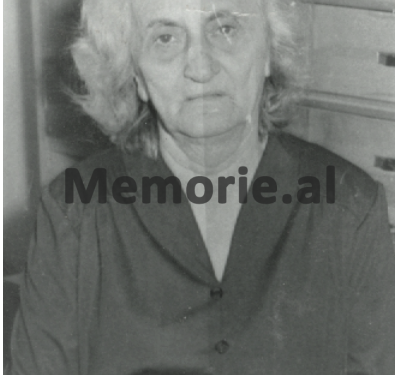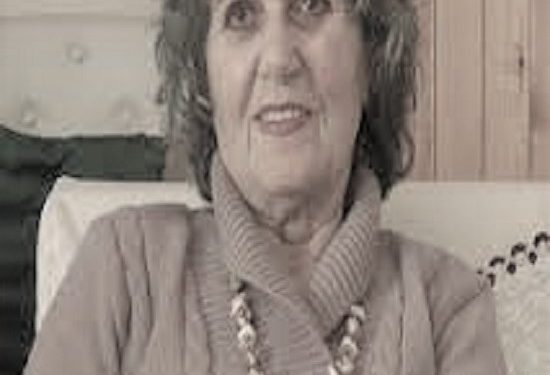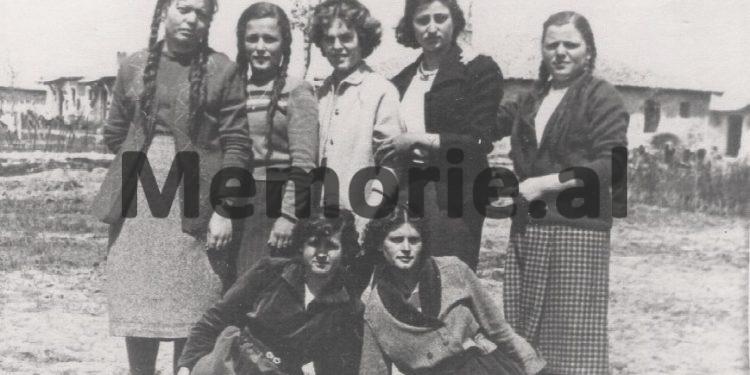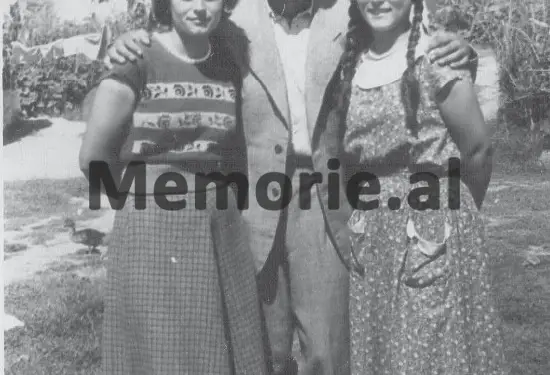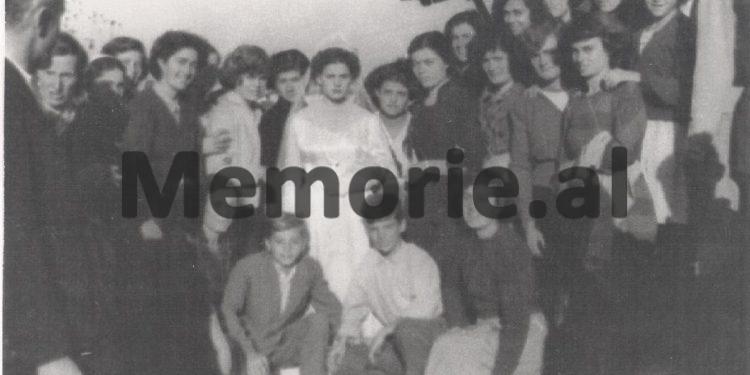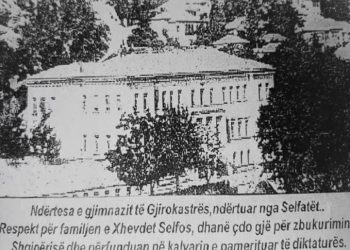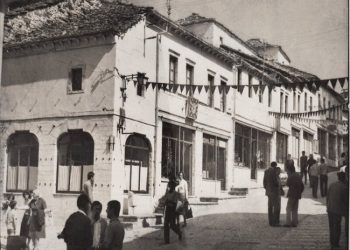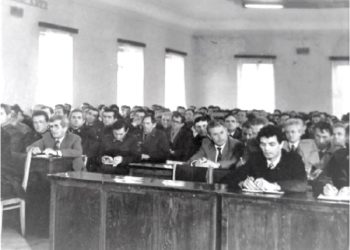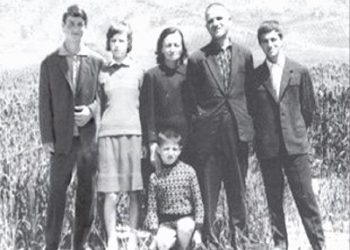Fatbardha Mulleti (Saraçi)
Part eleven
Memorie.al/publishes some parts from the book ‘Calvary of women in the prisons of communism’, by Fatbardha Mulleti Saraçi, (granddaughter of the famous former prefect of Tirana, Qazim Mulleti), whose family since 1944 until 1991, was persecuted by the communist regime of Enver Hoxha, where Fatbardha’s father, Haki Mulleti, a former senior state administration official from the 1920s, was imprisoned and interned by his family, until as he died in the hospital of Tirana, poisoned by the State Security. In her book ‘The Calvary of Women in Communist Prisons’, which is the fruit of several years of work, the author has masterfully described the unknown stories of some of the Albanian women and girls who suffered in prisons and internments in the dictatorial regime of Enver Hoxha, started by her mother, Pertefe Mulleti, and in turn: Marie Deda, Hajrie Kazazi, Kushe Seknej, Mrike Pali, Zyliha Rusi, Roza Jakova, Fatime Dilaveri, Hatixhe Pipa, Marije Gjoka, Angjelina Topalli, Hatixhe Kopliku, Nafije Kop Bushati, Budije Bushati, Adile Kazazi, Antonela Dostanishta, Nafije Stërmasi, Luçije Saraçi, Adile Meta, Qeuthere Meta, Feride Damnori, Vitore Ashta, Fetije Vuçiterni, Zehnije Gjylbegu, Xhyhere Kazazi, Luçije Malaj, Leadije Kazazi, Sadije Kazazi Hava Repishti, Luçije Kurti, Rukije Bushati, Shaqe Logoreci, Qamile Myftija, Marie Ndokëllia, Rozë Çefa, Çile Staku, Shaqe Marku, Lajde Arapi, Lutfije Barbullushi, Syme Muka, Zenepe Kraja, Fahrije Kazazi, Naxhije Plari, , Lizë Vukeli, Bade Kjaraj, Hava Baçi, Xhehadire Boriçi, Vitore Kalaj, Katerina Benusi, Sofije Baja, Lenë Pjetri, Dava Markagjoni, Mrika Markagjoni, Marta Gjonmarkaj, Bardha Gjon Markagjoni, Kristina Gjomarkaj, Çelestina Pervizarki, Kune Miraka, Sultana Dine, Vera Dine, Agime Dine, Hamide Çela, Vera Dine, Kadrije Cami, Sanije Sulaj, Meliha Sulaj, Vashe Kola, Prena Llesh Gjeçi, Gjystina Seku, Ilda Melgusha, Agime Pipa (Aranitasi), Terezina Pali, Liza Pali, Adile Boletini, Nasibe Kazazi, Ana Daja, Dila Zef Ndoja, Zyraka Mano, Shanisha Dosti, Zojë Gjeloshi, Drane Stakja, Elena Luli, Sabiha Kasimati, Marije Deda, Marije Shllaku, Biçe Pistulli, Sadije Kazazi, Gjyzepina Çoba, Marta Doda , Frida Satedini, Vitore Kuka, Gjela Llesh Biba, Bardha Cub Marku, Liza Llesh Mali, Bardha Mark Bushkola, Marije Tuci, Olimbi Baruti, Angje Kovaçi, Bedrije Ashikja, Musine Kokalari, Motër Gjeorgjina, Liljana Radovani, Laura Keqi, M Mrike Zadeja, Angjelina Shantoja, Naime Koçi, Sheriar Sefa, Vitore Shllaku, Liza Gjon Voci, Nina Shiroka, Laje Mehmeti (RRema), Feride Beshiri (Quku), Hasije Ulqinaku (Quku), Sofije Kali, Çile Gjush Larja, Nurfezo Koprencka, Sanije Gjylbegu, Emilja Shest Bregu, Vida Radovani, Nedrete Pipa, Motrat e Osman Kazazi, Safete Jusif Sokoli, Çiljeta Simoni, Lutfije Buashati, Sadije Bushati, Olga Schëeizer Libohova, Evelina e Ndoc Naraçi, Geraldina Apony-Zogu, Hilda Zyma. Marie Rafael, Zade Muka, Rukije Bushati, Hajrie Vrioni, Emine Gjyrezi, Xhemile Beqir Komi, Hedije Dume Repishti, Syme Muka, Fetije Vuçiterni, Sebije Puka, Marjeta Serreqi, Dhurata Sokoli, Klara Miraka (Merlika), Asi , Liri Cenaj, Rudina Dema, Adelajde Miraka, Drane Jakja, Syriha Hasi, Aishe Gogaj, Luçija Kaçaj, Gjyljana Malaj (Pervizi), Nadide Kasaruho, Nadire Kërçiku (Peshkëpia), Shpresa Ballolli (Merdani), Makbule Frashëri, Misly Çrash Dervishi (Leka), Natali Arkandi Rozengolc (Pengili), Vigelmina Vitalij Kovaleshko (Veshi), Rukije Rama, Tefta Tasi, Liri Lubonja, Kozara Kati, Shpresa Ngjela, Vera Bekteshi, etc.
Continued from the previous issue
Nexhi Plaku
(1914- L991)
At the peak of her life, when she had just turned 30, Nexhi Plaku, of the Danhasani family of Shkodra and we got married in Tirana, tried what she could not think of. Her husband, Hajro Plaku, is politically sentenced by the communist regime to 15 years in prison, leaving his wife with two children in misery. It was only 1947, because other events would follow…!
After being expropriated, as was proved by many other families, he is expelled. A word of mouth…! From her normal life, she would have to take the road to Kavaja, where she was interned. With much effort he was able to gain the right to live in Shkodra, his hometown. For almost 15 years she followed her husband to labor camps. And they were so hard…! Her husband had to dig chrome (Bulqiza) underground and open canals (Beden-Kavaja), places where many like him were buried forever.
Not just the bread he lacked. It was also a pity for the family that was waiting for him outside the wires. And Nexhi shared the little bread with the man who had it inside them…! With sacrifices that few can understand, she and her children filled as much as they could, the gap that followed her from year to year. For many years, with the hard work at the Zootechnics Station, with the money earned with blood, at It does, as the people say, she eased his sufferings. Meanwhile, like a cuddling herd of birds, she cared for her orphaned child, with a parent, alive. Like many other mothers…! Like many others he fed them with meager bread-education, injecting them with the desire and need of school.
The terrain was good. They had this desire. They grew up honest, and to get here, they did not have much work, because they had the model in front of their eyes. Need taught them to be hardworking and kind, that they needed not only to survive, but also to alleviate their many troubles.
Thankfully, her temperament helped her cope with her troubles. It was fortunate for her to be a devout believer. It was fortunate for him to have confidence in his own strength. Approachable to people, loved by them, with smiling eyes even when she was suffering and in despair, these were the qualities of her strong character. Collision everywhere. Always victorious: to keep her husband in prison and alleviate his suffering, and on the other hand to raise and educate her children. It was not easy to perform this task, you did hard work and lived in basements with humidity. Both man and woman…!
The effort did not go in vain. Hard work was never given to her, but she managed to perform her duties, as a woman and as a mother. Her children were role models. And when she could not walk because of the disease that gripped her, her son would ride her! So paralyzed rejoiced grandchildren…!
Lizë Vukeli
(1936)
It is not surprising that the communist dictatorship in Albania created so many political opponents. General economic misery, isolation from the civilized world, lack of more basic freedoms, two-legged violation of human rights, etc., etc., were among the main causes that increased popular anger. Thus, that of Liza Vukeli, especially when after 5 years of marriage, her husband is sentenced to 13 years in prison. With 3 small children she remained, so to speak, on the main road. His father came to his aid, who took him to his family.
It was little said that she suffered for the bread of the mouth. Working in the cooperative, gave it already dry. The husband also had to be helped, as much as he could. As she recalls: “The more I saw him, the more I brought him something”, followed him everywhere in prisons and labor camps, such as in Rubik, Fushë-Krujë, Elbasan and Spaç. Sometimes with her father, sometimes with her mother, more often alone or with other women prisoners. Most of the time on top of trucks, sometimes on foot. Not infrequently slept outside. Everywhere black…!
The children were growing up. They did well in school, but they knew they would not be able to continue it. They were destined to work separately in agriculture. And they understood this early. He felt sorry for them when he saw the differentiation being done to them. The children also felt sorry for their mother, who was coming and going from many troubles. She sighed, they gritted their teeth.
He worked his head off all day. Head down to the well for water, head down the road, so that no one could say a bad word to him. The man was in prison and she did not want to add to his suffering. So strong and with character she endured the long years of separation and loneliness. Stoically endured the perpetual hunger. He also endured the persecution that was inflicted on him from time to time. There were children growing up, waiting for her husband to be released, waiting for family reunification. He lived with the sweat of his brow and the beautiful memories of the past years, without regretting his correct attitude; he left to the suffering people the good name of the noble highlander.
Bade Kjaraj
(1926)
The village of Nikç, like the whole area of Kelmendi, has produced men who have put their chests on the border line, and have become a living shell in defense of the land’s landlordism. One of these families was that of Kadri Muçë, who gave the girl he had, Baden, to Aliaj of Kastrati for Islam Zeneli. It was 1943.
Two years of marriage. Only two. As in the early years, Badja, who was not more than 19 years old, now began to live a completely different life; quite unimaginable. Her husband, an anti-communist, decided to go to the mountains. Bades has to knock on investigators’ doors. Mocking and heartless investigators, sometimes threatening him and sometimes taking him for granted, asked him to tell them where the man was, who his friends were, where the weapons were hidden, etc., etc. Up to this point, everything seemed normal, but when she stood firm, then the torture began, so much so that even today she finds it difficult to remember.
In 1946 her husband was arrested. Not one police officer went to their house, but some. The first punishment for the whole family was the seizure of property. Alone, she had to keep herself, children, mother-in-law and husband in prison for several years. Then came the tax. She had to hand over the grain obligation, and since the milking machine was not given to her, it was obligatory, day and night, to sell the grain with sticks. One day some cousins came and told him that his brother was getting married. Walking towards Nikçi, in silence. The usual joy and gladness was lacking. “God, what is this? Where is the song? Where is the gas? Why does everyone just think? ” They finally got home. group of people. Nowhere wedding sign. Except oil and cry. His brother had been shot without trial. Just cried. What else to do?
In 1953 her husband was convicted again. Four years later, Baden, who already had three children and his mother-in-law, was forcibly evicted. This was the biggest torture of her life. It was March. Winter still standing. A family out. In the full sense of the word. A kind-hearted coachman sheltered them (at night) in his cart. That much he could do. For a month, this stroller was their shelter: of the three children sleeping above, below it, the one with the old woman. So until he found a basement, somewhere in the Kiras neighborhood. For the time being, this seemed like a luxury. In 1960, the man was released from prison. Until then he was fed in prison, now he had to be fed at home. Unemployed. Aunt without end. For 8 years in a row.
In 1968, after the husband refused the Security offer to cooperate with her, the family was interned in the village of Nënshat. A 3 x 3 m room was made available to him, completely uninhabitable. Badja ignored hard work, extreme cold and heat, ignored daily hunger. She did not endure the daily appeal, often several times a day. It was torture upon torture. 13 years internment. When her husband was paralyzed, what to do? 7 years we nailed them to the bed. She only fought with life on all planets, until democracy came, which found her exhausted, with the remains of her life partner in the village of Mjedë…!
Weather Baci
(1921 – 1998)
She was the only daughter of Ymer Tafilica. As such, and for the good qualities he possessed, that family of craftsmen, generation after generation, adored him.
She married Xheladin Baci, who had graduated from the American school of Fultz, where she was held as a professor. A son was born to him.
The communist regime did not hesitate at all to classify all the students of this school as “enemies of popular power”, “agents of American imperialism”, etc. So Xheladini was arrested and after two years of torture was sentenced to 10 years in prison. “Always, when I took his clothes to leave,” Hawaii says, “they were stained with blood.” With small children, she was forced to do all kinds of work. She also followed her husband who “walked” several prisons and camps (Tirana, Beden, Maliq, Orman Pojan). Many times he took the boy, who was growing up, to see his father. He had just entered the first grade, when he said to his mother: “Mother, when I grow up I will become a teacher and I will take care of my father”. Desolate, he did not have the luck to live, after he died at the age of 8. Nana Hava remained dry hearted.
Went to meet the man.
“Why did you come without the Mentor?” He asked immediately. My heart knows how I uttered those two heavy words, which killed the heart of the poor man, as much as my desolate heart. I told:
– Our only son is dead.
I can still hear his wailing, behind bars:
“We were left without the hope of the heart, without our future.”
Thus, once a week (while he was in Tirana prison) and once a month (when he was in the camps), this woman went to meet him and keep him, perhaps more morally than materially. “Always with big strains that, when they were heavy, I tied them with hemp, just like the highlanders do.”
The dictatorship was not enough to punish the man. Even when he was released, even when many more years passed, in 1976, they were remembered for this family. With false accusations, a man and a woman, now elderly, were sentenced to 3 and a half years each, a sentence that he suffered in Saranda and in Elbasan, she. She is now the only one that her husband died in 1995, after a paralysis. From the pandemic sufferings, she is now sick herself, surrounded by the care of her brothers, grandchildren and great-grandchildren. Such was her life. Only with a strong character, by being brave and proud of her husband, she coped with the situations, without complaining. She did not complain that she did not enjoy life: her heart cried for the boy and for the children who no longer had her votes.
Xhehadije Boriçi
(1915 – 2000)
Less than a month had passed since her son was born, when Xhehadije Boric’s husband, Feuzina, was arrested. For 20 years his “home” became Burrell Prison. What would a black woman do to you? Child to raise, man to hold. She knew in that look that she had succeeded. It had to press 7 kv. Starch per day to realize the norm. Since the salary was small, he did not hesitate to sell little by little the goods of the house; to feed the children and to feed the husband as well. Often, food did not fall into the hands of the latter.
For Jihadi, as for all other women, the trip to Burrel was a real torture. Most were young women, so they traveled in groups. The cars were few. Even those that were, they hardly got them, because the drivers, when they saw them so loaded, realized that they were heading to Burrell Prison and for fear of fines at the police posts, they did not take them. This was one of the reasons they walked most of the way. They spent the night by a post office or a house, on the side of the road.
Sometimes the police would say to a driver, “Hey, get these women.” And if these poor people got ready to get on the truck, he, with the signal given by the police, would leave, leave them alone, so tight, or run after him. It also happened to bring death to mind, but he quickly collected himself and said: “Husband in prison, children at home. What will they do without me”! Finally came the long-awaited moment of the meeting. Just 5 minutes, with the bars in the middle and the guards side by side. So much time to deliver fake food with so much difficulty. Sometimes they would not allow it, under the pretext of an epidemic.
He will never forget the moment when he took his son, now 7 years old, to meet his father. When the son saw his father, he wanted to hug him and hug him, but the ruthless hands of the guard forcibly removed him. Tears flowed from the eyes of the three. This is not forgotten even today by the son, now a mature man, the father of children himself. There is no way to forget. It was a horrible thing: the first time he saw his father. Jo! It cannot be forgotten! Maybe, later, even the police can be remorseful. Either way, the little boy, a first grader, saw for the first time the teeth of dictatorship.
Returning home was easier, as he had nothing with him except a blanket, which he used to cover himself at night, always concentrating on his thoughts. Especially when she found out that one of her friends had lost her husband because he had died in prison. “None of us,” she says, “divorced the man, as many communist women did later, when they fell from the” fig tree. “They remained faithful and raised honest and hardworking children.
The boy was able to become a teacher, but only schools in the more remote areas were assigned to him. Closer to “did not deserve”. Until one day he was fired. They were accustomed to hardship, poverty and persecution, so they faced it without crying. It was Dija (Jihadiya) who had taught them endurance./Memorie.al




